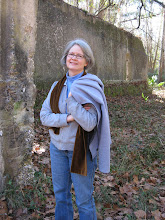I really did enjoy looking at some of the blogs required by Task 3. I approached the task rather randomly, choosing a blog on the environment to read first.
This blog confirmed my original rather negative views of blogging. I found it simplistic, adding nothing to the conversation about the environment, largely because of it's lack of informed detail. I could not discover the author of the blog; I chose not to email to find out. I think the blogger's credentials should be posted on the site; without the credentials, I am not willing to spend my time wading through article after article in the archives to see if this person has valuable things to say (although one can determine a lot from reading the one or two current posts).
I moved on to Carvin's Learner.com, which definitely changed my mind about the usefulness of this medium. So far, my primary experience with blogging has been social, or the occasional glance at a site like the environmental one described above. This sit met my criteria for knowing something about the blogger, which gave the site a chance...I committed the time to read because there was a clear professional writing, backed by a trusted source. I was rewarded by looking at the author's post, which was similar to a traditional newspaper columnist's work. The responding posts were like being able to read all letters to the editor following that column. The column then became a real forum for discussion, with (unedited) ideas represented in full. Of course, some of the responses were worth more than others, but it was fun to read them all. This kind of blog could change the way we converse on important ideas.
Finally, I chose to read the Woodward Academy blog by senior students on Jonathen Froer's Extremely Loud and Incredibly Close. I wanted to see how this sort of blog worked (albeit for older students) to see if I could accomplish something of the sort for my fourth and fifth graders around a literature book). There were few responses to posts, and the posts seemed to be on assigned topics. The teacher used the blog site to include background information to enrich the students' reading experience; I wonder if they actually read everything that was posted. There was a section for reflecting on the use of the blog, a useful assessment tool. However, most students seemed more excited that they had learned about blogging than that they had learned anything from the book. Many did report that they enjoyed reading each others' (assigned topic?) posts, but that they were not "creative" enough or did not have enough time to really respond to those posts.
While there are so many blogs, so many Pi2.0 assignments, and so little time, I must say I'm looking forward to reading a few more. One thing I do not like about reading some of the sites is the distracting advertising, etc. in the margins. I guess this will take practice, like ignoring the ads on the pages of papers or magazines while reading an article.
Sunday, February 22, 2009
Subscribe to:
Post Comments (Atom)


Thank you for your thorough post! I'm glad to hear you questioning the validity of blogs - so many people (including teachers) don't. Since the internet is being used more and more for research, it is imperative that we teach web literacy skills to our students!
ReplyDeleteI don't know how to create a link yet, either. I feel a little as though I'm going up a ladder but some of the rungs (my lack of experience?) are broken.
ReplyDeleteI had thought before I started out that blogs would be a waste of time and initially I was frustrated trying to follow some of the links.
I really hate the word "blog" because it connotes "blab"to me. However, as I've read more, I've come to understand some of the value in blogging. I hope to become more practiced and discretionary in or through all of this. I appreciate what you've written because you've nailed some of my thought processes.